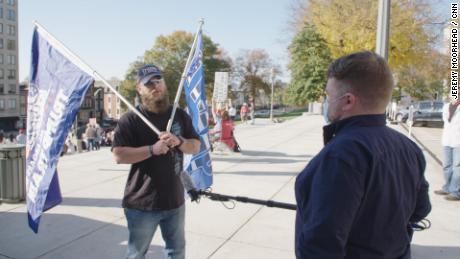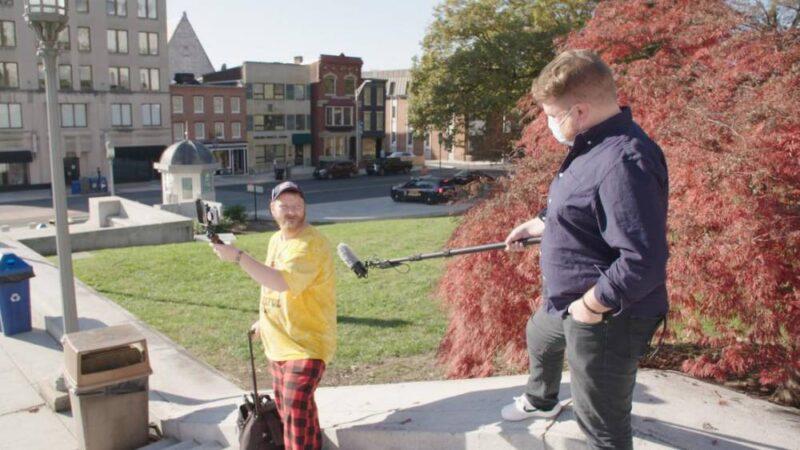Atlanta, Georgia (CNN)After years of standing idly by, companies like Facebook and Twitter are, to varying degrees, calling bullshit on some of President Donald Trump’s lies — most prominently, his false claim that he didn’t lose the election.
These social media platforms are still awash with misinformation and hate — and many critics of Big Tech on the left say the platforms still aren’t doing enough about it — but to Trump’s supporters, the steps Big Tech has taken to slow the spread of misinformation amounts to censorship. And some have begun seeking alternative homes online. “I can write anything on Facebook and it’s taken down, fact-checked,” Kim Ashworth, a Trump supporter who I met at a “Stop the Steal” event protesting the result of the election in Atlanta two weeks ago, told me. “Anything about the election, about Donald Trump, they take down.”
She was talking about Facebook’s third-party fact-checkers who label misinformation as false on the platform.Two of Facebook’s fact-checkers who spoke to CNN said they call out misinformation on both sides, but at the moment there is just more misinformation on the right. Read More


JUST WATCHED
An online movement has these Trump supporters convinced the election was stolen
ReplayMore Videos …MUST WATCH
An online movement has these Trump supporters convinced the election was stolen 05:22″Stop the Steal,” a movement which baselessly claims the election was stolen, is itself based on online misinformation and is being pushed by known peddlers of conspiracy theories, including former Trump aides Roger Stone and Steve Bannon. Kari Tingley, who was also at the protest in Atlanta, told me Twitter put a restriction on her account after she shared a post claiming masks were not effective in combating the spread of Covid-19. That claim is false, but she believes it. Twitter most likely took action against her account because it has rules against dangerous Covid-19 misinformation. Both women told me they now use Parler — a platform that touts itself as a “free speech social network.”In the days after the election, Parler topped the charts of the Apple and Android app stores, and the platform has become a hub of Trump-backed conspiracy theories casting doubt on the election of President-elect Biden. Among the top trending topics on the platform this week are #TrumpWon, #VoterFraud and #NeverQuit.


JUST WATCHED
Fact-checker calls the person who sent him a death threat
ReplayMore Videos …MUST WATCH
Fact-checker calls the person who sent him a death threat 04:56But while many Trump supporters I have spoken to have dabbled in alternative social media platforms, almost none of them had totally ditched services like Facebook and Twitter. Some say they don’t want to cede the space to the “other side,” some want to be able to see what the other side is saying and to argue with them. And some know that, despite a surge in popularity for apps like Parler, it could fizzle out and die — they don’t want to waste time building a network on an alternative app that might fail. (There’s also the technical side. Like any new service, Parler’s design isn’t as slick and its load-time isn’t as quick as the likes of Facebook.) But the notion that people are trying out other platforms because they believe their conversations are being stifled on Facebook and Twitter might help explain Big Tech’s historical reluctance to crack down on misinformation. Facebook and Twitter were slow to combat misinformation on their platforms, and really only did so only after public outcry following the 2016 election. Executives from Facebook and Twitter were dragged in front of Congress to answer for how their platforms were used by people here and in Russia to foment division and spread lies. A covert Russian troll group ran fake social media pages seen by millions of Americans and it all seemingly went undetected by the tech giants In advance of the 2020 election, both companies created new policies, tweaked some algorithms, and added some new features like ways the companies can flag misinformation to users. But that creates its own set of challenges and chafes against users who believe or who are being told by the President and other prominent conservatives to believe misinformation. Now, every fact-check on Facebook and every label on Twitter sets a new standard that these companies will be judged against.


JUST WATCHED
These Trump supporters say Fox News is too liberal
ReplayMore Videos …MUST WATCH
These Trump supporters say Fox News is too liberal 02:09At a recent Senate hearing Twitter CEO Jack Dorsey was asked why Twitter had flagged some Trump tweets as misinformation, but not a tweet from Iran’s supreme leader that defended Holocaust denialism. It is a logical and fair question. And it signifies why these companies so desperately do not want to become, in Mark Zuckerberg’s words, the “arbiters of truth.” They view it as a slippery slope. But Parler, and the people who join it, might find themselves on a slippery slope, too. Accounts with swastikas as their profile pictures and disgusting racist posts are not hard to come by on Parler.
8Chan (now 8Kun) is an online messaging board that also touts itself a bastion of free speech. In 2019, suspects in three mass shootings were linked to the platform. Ben Decker, the CEO of Memetica and an expert in online radicalization, says platforms that allow unbridled free speech can become hubs of unbridled hate.
Source: edition.cnn.com

